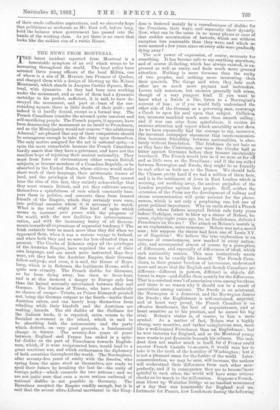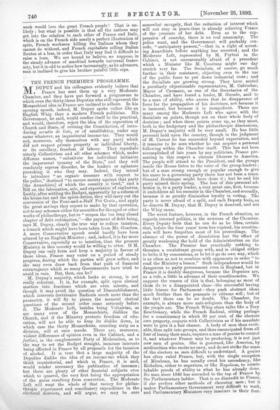THE NEWS FROM MONTREAL. T HE latest incident reported from Montreal
is a lamentable symptom of an evil which seems to be increasing throughout the world. The local police have arrested three young officers of the local Militia, one of whom is a son of M. Mercier, late Premier of Quebec, and charged them with a design of blowing up the Nelson Monument, which stands in Jacques Cartier Square, Mon- treal, with dynamite. As they had been seen working under the monument, and as one of them had a dynamite cartridge in his pocket, sufficient, it is said, to have de- stroyed the monument, and part at least of the sur- rounding square, there is little doubt of their guilt ; and indeed it is hardly denied, except in a formal way. The French Canadians consider the accused quite innocent and self-sacrificing people. The French papers, it appears, have been denouncing the monument as an insult to Frenchmen, and as the Municipality would not remove " the adulterous Admiral," are pleased that any of their compatriots should be courageous enough to take the duty upon themselves. The only motive assigned for the act is national spite,—a spite the more remarkable because the French Canadians hardly assert that they have a grievance, and have not the smallest hope of rejoining their ancient nationality. They must from force of circumstances either remain British subjects, or become members of a Canadian Republic, or be absorbed in the United States, whose citizens would make short work of their language, their aristocratic tenure of land, and the privileges of their Church. They cannot bear the idea of this fate, they entirely acknowledge that they must remain British, and yet they cultivate among themselves a spitefulness of race which constantly ham- pers them in politics, and converts them from trusted friends of the Empire, which they certainly were once, into political enemies whom it is necessary to watch. What is the real origin of this kind of spite which seems to increase Tani paean with the progress of the world, with the new facilities for intercommuni- cation, and with the increasing lenity of all Govern- ments towards all expressions of separatist tendency P The Irish certainly hate us much more than they did when we oppressed them, when it was a serious voyage to Ireland, and when both they and we were far less educated than at present. The Czechs of Bohemia enjoy all the privileges of the Austrian Empire, have regained the use of their own language, and are much more instructed than they were, yet they hate the Austrian Empire, their German fellow-subjects, and even, it is said, the House of Haps- burg, which is in Bohemia the legitimate House, with a quite new vivacity. The French dislike for Germans, so far from dying away, has risen to fever-heat, and is at this moment a danger to Europe only less than the hatred mutually entertained between Slav and German. The Italians of Trieste, who have absolutely no chance of escape—Trieste, as Prince Bismarck pointed out, being the German outpost to the South—loathe their Austrian rulers, and can barely keep themselves from rebelling While their kinsfolk and the Austrians are making friends. The old dislike of the Sicilians for the Italians lends, it is reported, extra venom to the Socialist movement in the island, which is said to bo absorbing both the autonomists and the party which desired, on very good grounds, a fundamental change in tenure. The seventy-five years of peace between England and France has ended in a spite- ful dislike on the part of Frenchmen towards English- men, which, if it were reciprocated hero, would lead to a great maritime war, and which embarrasses the diplomacy of both countries throughout the world. The Norwegians, after seventy-five years of amity with the Swedes, who spring from the same stock as themselves, are ready to spoil their future by breaking the last tie—the unity of foreign policy—which connects the two nations ; and we are not quite sure that even a more serious outbreak of national dislike is not possible in Germany. The Bavarians accepted the Empire readily enough, but it is said that the recent ultra-Liberal movement in the King- dom is fostered mainly by a recrudescence of dislike for the Prussians, their ways, and especially their dynasty. Now, what can be the cause in so many places at once of that sudden accentuation of hatreds, which are without exception less reasonable than they were, and which we were assured a few years since on every side were gradually dying away ? The new power of expression, of course, accounts for something. It has become safe to say anything anywhere, and of course ill-feeling, which has always existed, is ex- pressed as well as amity, and finds much more general attention. Nothing is more tiresome than the amity 'of two peoples, and nothing more interesting - than their quarrels. The things said when they hate each other are so much more piquant and instructive.
Lovers talk nonsense, but enemies generally talk sense, though of a very pungent kind. If you want to know what a Swede is like, listen to a Norwegian's account of him ; or if you would fully understand the other side of the German as a governing man, encourage a Czech to open his soul upon that subject. Collision, too, interests mankind much more than smooth sailing ; and if war can arise from spitefulness, it excites an anxious attention and report which amiability never does. As we have repeatedly had the courage to say, moreover, the incessant newspaper statement that intercommunica- tion increases friendship between nationalities, is abso- lutely without foundation. The Irishmen do not hate us as they hate the Ulstermen, nor were the Czechs half so bitter against Germans before they became inextricably interlaced. The French would love us if we were as far off and as little seen as the Brazilians ; and if the sea rolled between Norwegian and Swede, they might be as friendly to each other as both are to the Danes. We should hate the Chinese pretty hard if we had a million of them here, and it is the settlement of Jews in East London which is reviving, not soothing away, the ancient prejudice of the London populace against that people. Still, neither the extension of the Press nor the development of railway and steam communication will quite account for the pheno- menon, which is not only a perplexing one, but one of great political importance. Why on earth should a French colonist, whose fathers accepted British rule forty years before. Trafalgar, want to blow up a statue of Nelson, be- cause, eighty-eight years ago, he, an Englishman, defeated Frenchmen on the sea ? The attack on Nelson's morals Is, as an explanation, mere nonsense. Nelson was not a moral man ; but suppose the statue had been one of Louis XV. or of Napoleon ! We believe the true explanation is an increase of consciousness, now marked in every nation- ality, and accompanied almost of course by a perception of differences, and especially of differences of ideal, which each nationality resents.. This man instinctively wants that man to be exactly like himself. The French Cana- dians, in their greater freedom of intercourse, understand more and more that the English and Scotch Canadians are different—different in powers, different in objects, dif- ferent in ways—and dislike them acutely for the differences. That is a constant resift of association even among brothers, and there is no reason why it should not be a result of association among nations. The Swede is an aristocrat, the Norwegian is a democrat, and the Norwegian damns the Swede ; the Englishman is self-contained, ungenial, and at heart very proud, the French Canadian is an effusive Southerner, the best of acquaintances, and at heart sensitive as to his position, and he curses his big rival. Nelson's statue is, of course, to him a mere symbol. As a matter of fact, Nelson was a highly strung, very sensitive, and rather vainglorious man, more like a well-trained Frenchman than an Englishman ; but he won victories for England, and so the Montreal young man wants to put dynamite beneath his column. The inci- dent does not matter much in itself, for if France could recover French Canada to-morrow, it would ruin her to take it in the teeth of the hostility of Washington ; but it is not a pleasant omen for the future of the world. Inter- communication, we may be sure, will increase, the nations will understand their differences from each other more perfectly, and if in consequence they aro to become:more spiteful to each other, the world will have some serious cheeks on its march to the millennium. Suppose a French- man blows up Waterloo Bridge as an insolent monument of a day that was honourable for England and un- fortunate for France, how Londoners during the following week would love the great French people That is un- likely ; but what is possible is that all the nations may get into the relation to each other of France and Italy, which is on the French side nearly a perfect illustration of spite, French workmen killing the Italians whom they cannot do without, and French capitalists selling Italian Rentes at a loss, in order that Italy may find it difficult to raise a loan. We are bound to believe, we suppose, in the steady advance of mankind towards universal frater- nity, but it is odd to notice how increasingly, as he advances, man is inclined to give his brother painful little nips.







































 Previous page
Previous page